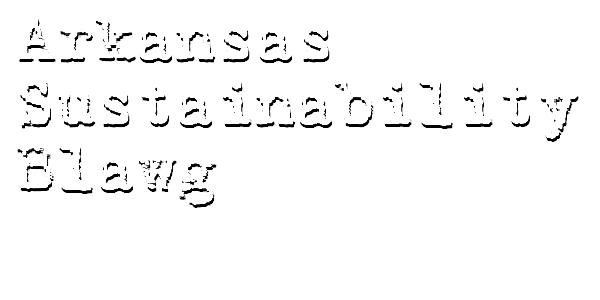Last April, at the Little Rock Downtown Partnership annual luncheon, I heard “sustainability” referred to as the result of the process of thoughtful place-making. In contrast, at least some local policy makers – for example, the members of the Little Rock Sustainability Commission – conceive of “sustainability” as a process. Others distance themselves from the “true believers” and wade into the fray with a purely economic perspective.
I appreciate this polemic because it is thought provoking, but the reality is these viewpoints are not mutually exclusive.
The question of whether Arkansas municipalities should take the next step in improving residential energy efficiency and adopt Chapter 4 of the 2009 International Energy Conservation Code (acronym alert: IECC) is a perfect example.
Arkansas currently operates under the 2003 IECC for residential construction. (In this regard, it keeps company with Nebraska, Oklahoma, West Virginia, and the U.S. Virgin Islands. With the exception of Vermont, which follows the 2004 IECC, all of the 42 states that have adopted the IECC use either the 2006 or the 2009 version.) The 2009 IECC is substantially different from the 2003 IECC, and these differences are specifically intended to improve energy efficiency. According to a 2009 study by the U.S. Department of Energy, “Impacts of the 2009 IECC for Residential Buildings at State Level,” “important new requirements” in the 2009 IECC include:
- A requirement that duct systems be tested and sealed, and air leakage minimized;
- Half of the lighting “lamps” in a building must be energy efficient;
- “Trade-off credits” are no longer available for high efficiency HVAC equipment. For example, under the 2006 IECC, use of a high efficiency furnace could be traded for a reduction in wall insulation. Such trade-offs are eliminated under the 2009 IECC;
- Vertical fenestration U-factor requirements and maximum allowable solar heat gain coefficients are reduced;
- Insulation requirements are improved and increased;
- Better air-sealing language;
- Controls for driveway/sidewalk snow melting systems; and,
- Pool covers are required for heated pools.
Obviously, more efficient sidewalk snow melting systems, basement insulation, and heated pools are not going to drive improved residential energy efficiency in Arkansas. The improvements in duct and HVAC efficiency, building envelope tightness and air sealing, and window and insulation requirements are the meat of the coconut for those in the Arkansas sustainasphere.
Against that background, lets dissect the case for adopting the 2009 IECC.
In 2009, the U.S. Department of Energy analyzed the impact of the 2009 IECC in Arkansas. The DOE study found an average savings of $242.00 per house, per year for homes meeting the requirements of the 2009 IECC. Here is a table summarizing the savings:
Annual savings of $242.00 might not, at first blush, blow your skirt up. But consider: if the average life of a home is 30 years, not adopting the 2009 IECC will result in homeowners paying an additional $7,260.00 in energy costs over the life of the home.
There are additional economic considerations. First, the American Recovery and Reinvestment Act – commonly known as “the stimulus” – requires states that receive stimulus funding to adopt the 2009 IECC.
Second, adoption of the 2009 IECC will stimulate job creation and growth. The new requirements for air duct testing and sealing, and for general building envelope tightness will translate directly into a need for quality third-party testing, inspection, and compliance professionals. In simple terms, this means more home energy raters, auditors, inspectors, specialists, and consultants. These are skilled positions. Once created, they should become permanent parts of the sustainable economy.
But more than pure economics, adopting the 2009 IECC can be seen as an integral step on the path to sustainability. Green building technology is rapidly evolving, and the only surefire way to ensure that Arkansans are provided with affordable, reliable, and sustainable energy is to adopt and enforce updated building standards based on current technology.
In the final analysis, if Arkansas is going to become a true leader in sustainability, the state is going to need to make substantial improvements both in the quantity and quality of its sustainable systems and in the way in which those systems are coordinated. A theme that unites both needs is the creation of a culture of sustainability. In simple terms, Arkansans need to get into the habit of thinking and acting sustainably in all aspects of their lives. As I’ve previously written, a compelling argument can be made that Arkansas public policy supports energy efficiency and sustainability, even if that policy lack cohesiveness. Adopting the 2009 IECC is not only consistent with that public policy, but it pushes it down to a level that can have a real impact on the everyday lives of Arkansans.
Indeed, because Arkansas is not going to shun federal stimulus funds, adoption of the 2009 IECC is inevitable. So the real question is this: why wait?
 Click, and you will find a vast collection of articles on sustainable businesses and sustainable business practices.
Click, and you will find a vast collection of articles on sustainable businesses and sustainable business practices.







